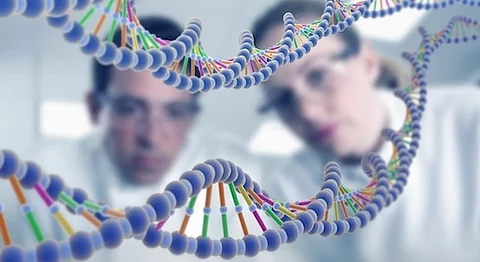
- HOMEGROWN WORLD
- #HGCREATORS
- #HGEXPLORE
- #HGVOICES
- #HGSHOP
- CAREERS
- ABOUT US
- CONTACT US

The largest ever study of gay brothers from 384 families has yielded the most statistically robust findings yet - that being gay is genetically determined. The study clearly links sexual orientation in men with two regions of the human genome that have been implicated before, one on the X chromosome and one on chromosome 8.
That’s right, scientific data now backs that we were born this way. The discovery casts a definitive angle to the long-standing debate about homosexuality being genetically linked, as opposed to a matter of choice.
”This study knocks another nail into the coffin of the ‘chosen lifestyle’ theory of homosexuality,” added Simon LeVay when speaking to New Scientist. “Yes, we have a choice in life, to be ourselves or to conform to someone else’s idea of normality, but being straight, bisexual or gay, or none of these, is a central part of who we are, thanks in part to the DNA we were born with.”
Simon LeVay is the neuroscientist and writer who, in 1991, claimed to have found that a specific region within the hypothalamus, is found to be smaller in gay men, probing other researchers to dig deeper into the biological origins of sexual orientation.
”Much hard work now lies ahead to identify the specific genes involved and how they work, as well as to find equivalent genes in women,” he adds
Alan Safers, who headed the project, said that the discovery “erodes the notion that sexual orientation is a choice”, emphasising that multiple environmental and genetic factors feature into traits as complex and immense as sexuality.
He also stressed that scientists have yet to determine which genes, specifically, contribute to sexual orientation as – even if he has zeroed in upon the individual genes, it’s likely that they’ll only have, at most, a small effect on their own, as witnessed in studies for the genetic basis for intelligence, for instance.
Researchers analysed blood and saliva samples from 409 pairs of brothers (including non-identical twins) over a period of five years, looking for shared locations of genetic markers called single nucleotide polymorphisms (SNPs). Because the twins were non-identical, other genetics such as height, hair colour, and eye colour differed, while this one gene remained the same in all the pairs. They found five SNPs commonly shared by the gay men, all clustered in two distinct locations on separate chromosomes.
This didn’t stop from a general reaction of cheers from researchers that welcomed the discovery, which verifies a 1993 study by the US National Institutes of Health, the first of its kind to come to a similar conclusion.
”The most pleasing aspect is that the confirmation comes from a team that was, in the past, somewhat sceptical and critical of the earlier findings,” says Andrea Camperio Ciani of the University of Padua in Italy.
